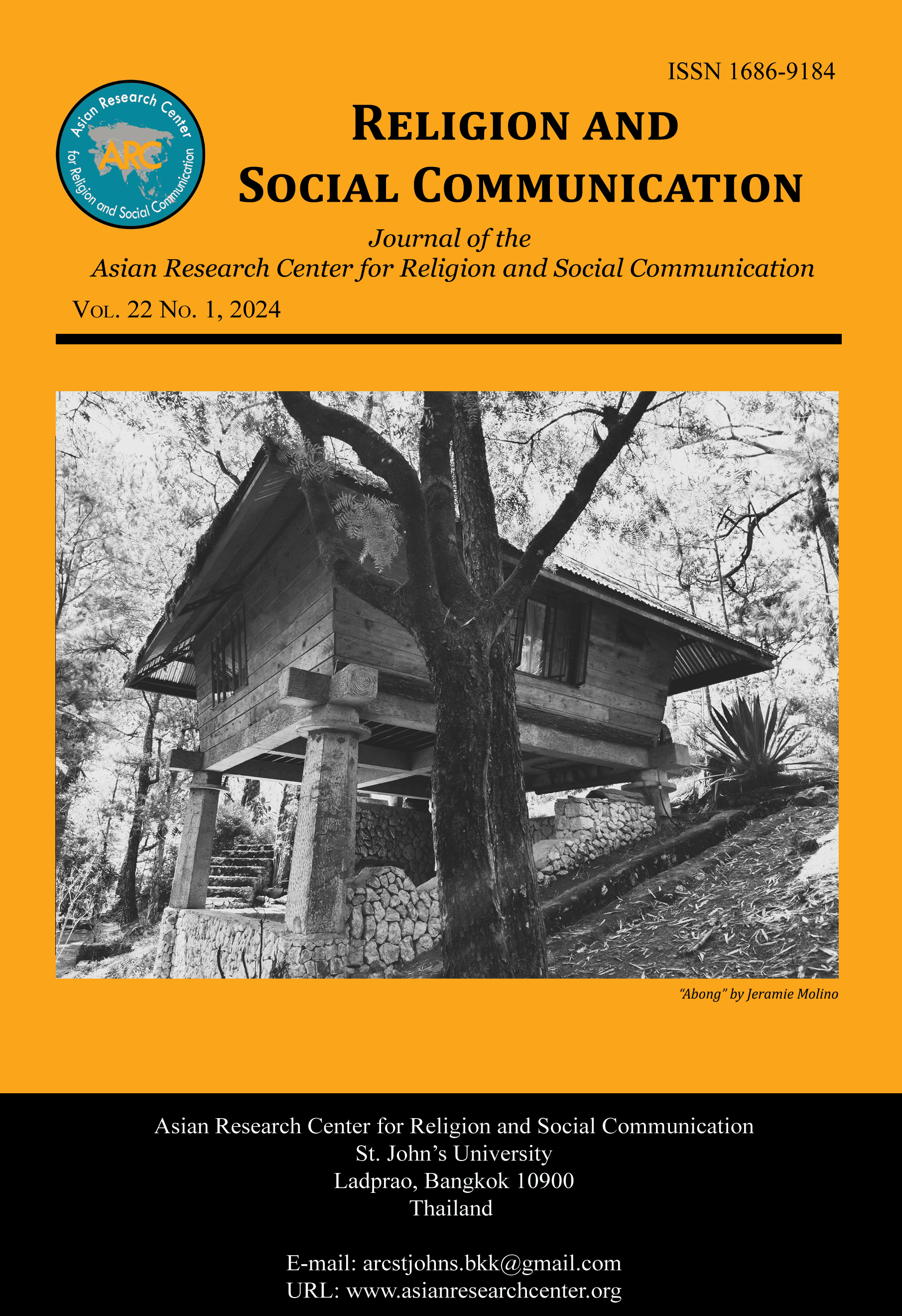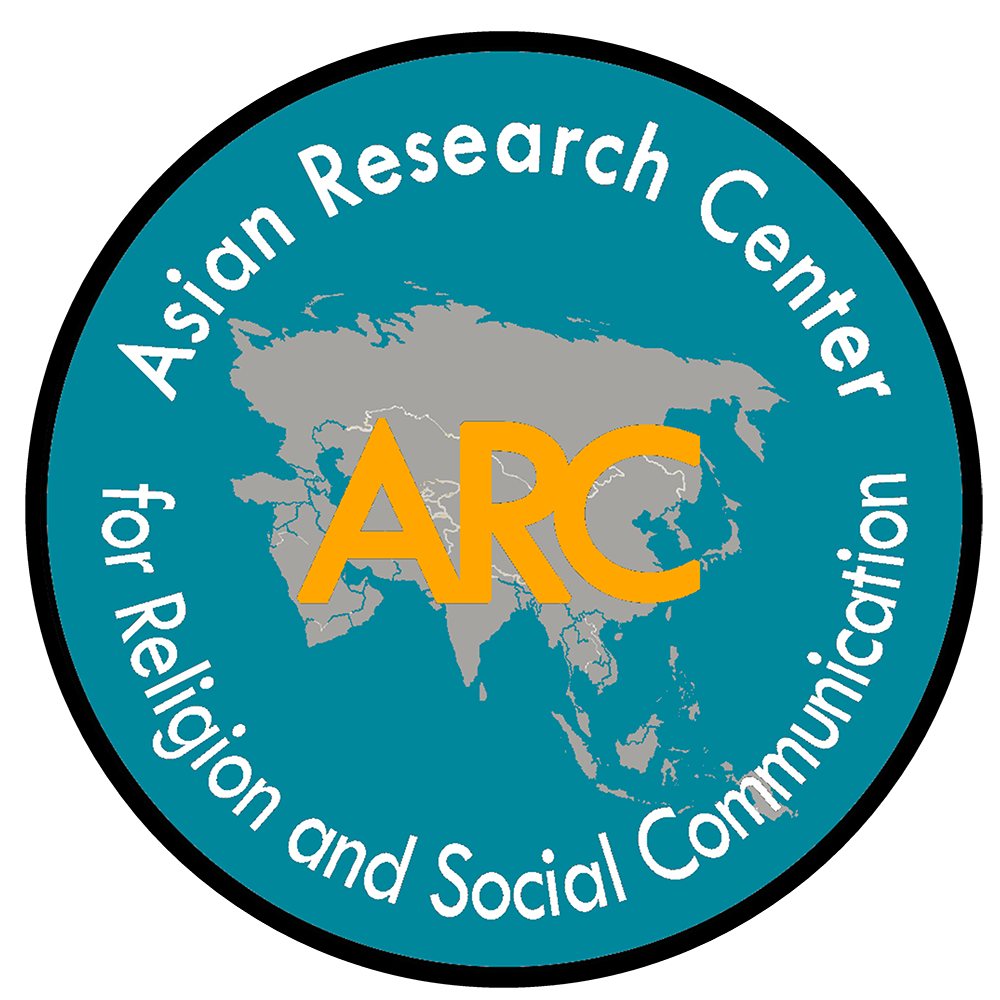Roles of Indigenous Peoples Leaders in the Indigenization of Education: Basis for an Indigenous Peoples Education
Download
RELIGION AND SOCIAL COMMUNICATION VOLUME 22, NO. 1 (2024)
ISSN 1686-9184
Author
Marisa Basiwal- Ao-wat and Carmelita Tovera-Ayang-ang
Abstract
This basic qualitative study delves into the pivotal role of Indigenous Peoples (IP) leaders in the indigenization of the curriculum, acting as the cornerstone for the development of an Indigenous Peoples Education Program. The study investigates the multifaceted responsibilities undertaken by IP leaders, assuming roles such as translators, facilitators/ resource persons, coordinators, and narrators in the intricate process of curriculum development. Addi-tionally, the research scrutinizes the various issues and challenges that these leaders encounter in fulfilling their crucial roles. Key challenges identified include a lack of awareness regarding their rights as integral members of the indigenous community, insufficient educational and training opportunities, limited access to pertinent sources for IPs, and a deficiency in knowledge, skills, and representation within the Department of Education (DepEd). These challenges underscore systemic barriers that impede the effective participation of IP leaders in the indigenization of the curriculum. In response to these findings, the study advocates for the implementation of a comprehensive Indigenous Peoples Education Program. This pro-posed program aims to address the identified challen-ges by focusing on providing education and training for IP leaders, raising awareness about their rights, and advocating for their active representation within the educational system. It is anticipated that the implemen-tation of the recommended IP Education Program will contribute to a more inclusive, culturally sensitive, and representative curriculum that aligns with the diverse perspectives of Indigenous Peoples, fostering a harmo-nious coexistence between traditional knowledge and mainstream education.
Keywords
Indigenous Peoples, indigenization, contextualization, IP education
References
Arquiza, Mucha-Shim Q. “Philippine Ethnic and Muslim Minorities: Educating Children the Traditional Way.” Mountain Research and Development 26, no. 1 (2006): 24-27. https://doi.org/10.1659/0276-4741(2006)026[0024:PEAMME]2.0
Ayang-ang, S.D. “The Kalinga Bodong and Its Implications to Education.” Baguio Colleges Foundation, Baguio City ,1973.
Bangcas, Josephine A., Husna T. Lumapenet, and Melrose B. Peralta. “Stakeholders’ Support on the Implementation of Indigenous Peoples Education (IPED) Program.” IJARIIE-ISSN 8, no. 3 (2022): 17503. www.ijariie.com.
Barton, Roy. F. “The Kalingas, Their Institution and Law.” Chicago: The University of Arizona Press, 1949.
Billiet, Francisco, and Francis Lambrecht. “The Kalinga Ullalim and Ifugao Orthography.” Baguio City: Catholic School Press, 1970.
Cobo, Jose M. “Study of the Problem of Discrimination Against Indigenous Populations” [Un-document E/CN]. 1983. Retrieved from https://www.un.org/development/desa/indigenouspeoples/publications/2014/09/martinez-cobo-study/.
Cornelio, Jayeel. S., and David Faustino T. de Castro, “The State of Indigenous Education in the Philippines Today.” In Indigenous Culture, Education and Globalization, edited by J. Xing and P.-S. Ng, 59-179. Berlin, Heidelberg: Springer, 2016.
Department Order No. 32, s. 2015. “Adopting the Indigenous Peoples Education Curriculum Framework.” Retrieved from http://www.deped.gov.ph/press-releases/depedissuesiped-curriculum-framework.
DepEd Order No. 22. “IPEd Program Implementation” (Jowi, 2013). Research and Public Management. UP Open University: Diliman, Quezon City, 2016.
Doyle, Cathal. “The Philippines Indigenous Peoples Rights Act and ILO Convention 169 on Tribal and Indigenous Peoples: Exploring Synergies for Rights Realization.” 2019. https://doi.org/10.1080/13642987.2019.1679120.
Dozier, Edward P. “The Kalingas of Northern Luzo, Philippines.” Chicago: Holt Rhinehart and Winston Inc., 1967.
Eduardo, J. “Indigenous Peoples’ Rights Act (IPRA) of 1997: A Standpoint from Selected Higher Education Institutions in Nueva Ecija after 20 years.” Journal of Progressive Research in Social Sciences 8, no. 1 (2018): 595-613.
EFA (2015). “Philippine Education for All. Philippine Development Plan 2017-2022.” Retrieved from https://www.academia.edu/34768288/Philippine_Development_Plan_PDP_2017-2022 (July 6, 2018).
Ganal, Nicette. “The University of Ottawa Indigenous Peoples Education Curriculum Model: Basis in the Development of Indigenous Peoples Education Curriculum for PNU-North Luzon.” The Normal Lights 11, no. 1 (2017): 198-234.
Hare, John. “Holistic Education: An Interpretation for Teachers in the IB Programmes” [IB position paper]. International Baccalaureate Organization, 2010. https://www.semanticscholar.org/paper/Holistic-education%3A-An-interpretation-for-teachers-Hare/cf3826aa7de1a7bd1f4e1d50339c02e76040c38e.
Hornberger, Nancy H., et al. “Ethnography of Language Planning and Policy.” Language Teaching 51, no. 2 (2018): 152-186. doi:10.1017/S0261444817000428.
Top of Form
Ismail, Masturah S., and Courtney B. Cazden. “Struggles for Indigenous Education and Self-Determination: Culture, Context, and Collaboration.” Anthropology and Education Quarterly 36, no. 1 (2005): 88-92.
Lacson, Manuel. “Regional Director, Department of Education, Region 03”, (2020) accessed January 2024, https://region3.deped.gov.ph/directory/
Maslan, Faustino. K. “The Influence of the Bodong System to Public Administration.” PhD diss., Saint Louis College of Tuguegarao, Cagayan, 1980.
May, Stephen, and Sheila Aikman . “Indigenous Education: Addressing Current Issues and Developments.” Comparative Education 39, no. 2 (May 2003): 139-145.
Mercado, Mark Gill Mateo. “Culturally responsive curriculum: A Case Study of IP School in the Philippines.” Journal of Community Development Research (Humanities and Social Sciences) 14, no. 3 (2021): 1-9.
Montemayor, Arnold. “Safeguarding Culture and Heritage through Education.” Regional Focal Person for IPED, Region 03. 2020.
Ocampo, Dina Joana, Rozanno Rufino, and Junette Fatima Gonzales. “Participatory Policy Formulation on Indigenous Peoples Education in the K to 12 Basic Education Program in the Philippines.” In Minding the Marginalized Students Through Inclusion, Justice, and Hope, Vol. 16, 211-242. Emerald Publishing Limited, 2021.
Republic of the Philippines, Congress of the Philippines, Metro Manila. “The Indigenous Peoples Rights Act of 1997 (Republic Act No. 8371).” Retrieved from https://wipolex.wipo.int/en/legislation/details/5755.
Republic of the Philippines, Department of Education. “August 8, 2011 DO 62, S. 2011 – Adopting the National Indigenous Peoples (IP) Education Policy Framework.” Retrieved from https://www.deped.gov.ph/2011/08/08/do-62-s-2011-adopting-the-national-indigenous-peoples-ip-education-policy-framew.
Reyhner, Jon, and Navin K. Singh.” Indigenous Education in a Global Context.” 2015. http://www.oxfordbibliographies.com/view/document/obo-9780199756810/obo-9780199756810-0064.xml.
Top of Form
Sallidao, Columbus F. “The Kalinga Bodong in the Maintenance of Peace and Order: An Evaluation.” Ph.D. diss., Saint Louis College of Tuguegarao, Cagayan, 1982.
Steinhauer, Evelyn. “Thoughts on An Indigenous Research Methodology.” Canadian Journal of Native Discrimination 26, no. 2, (2002): 69-81.
Soriano, Maya N. “Mainstreaming Indigenous Peoples and Indigenous Knowledges into the Public School System: A Case Study of Tubo Elementary School in Bataan, Philippines.” (Master’s Thesis). Otawa, Canada: Heritage Branch, 2008.
Sugguiyao, Miguel. “The Kalinga Hill Tribes of the Philippines.” Quezon City: Office of Northern Cultural Communities, 1990.
Tecson, Zorayda. “IP Leaders, Partner in Educating Youths Amid Covid-19.” Vlog. San Fernando Pampanga, 2020.
Tolentino, Melanie P. “The Role of Elderly on IP Education and Self-Determination: A Mini Ethnographic Study in Aeta Community.” Presented at the DLSU Research Congress 2017 De La Salle University, Manila, Philippines, 2017.
United Nations Declaration on the Rights of Indigenous Peoples. Retrieved from https://bit.ly/1bKIrMs (August 04, 2018).
UNESCO. “Why Language Matters for the Millennium Development Goals.” 2012. Retrieved from https://bit.ly/2JjkjZp (August 9, 2018).
Valenzuela, Jon Mark R., et al. “Exploring the Experiences and Practices of Elementary Teachers in the Aeta Tribal Community: Revealing their Worth towards Excellence in Education.” International Journal of Multidisciplinary Research (IJAMR) 6, no. 4 (2022): 467-476.Top of Form
Victor, Marie Lourie, and Belmer Yano. “Actualizing the Inclusion of Indigenous Peoples’ Rights in Education: A Policy Initiative in the Philippines.” 2016. Asia-Pacific Human Rights Information Center (HURIGHTS OSAKA). 8F, CE Nishihonmachi Bldg., 1-7-7 Nishihonmachi, Nishi-ku, Osaka 550-0005, Japan. https://www.hurights.or.jp/archives/asia-pacific/section1/Full%20pages%20HREAP%20V6.pdf#page=134.
Vygotsky, Lev Semenovich, and Michael Cole. Mind in Society: Development of Higher Psychological Processes. USA: Harvard University Press, 1978.
PAGES 58-86
DOI: https://doi.org/10.62461/MBCT091523
Submitted: 8.20.2023; Accepted: 9.15.2023; Published: 1.31.2024





